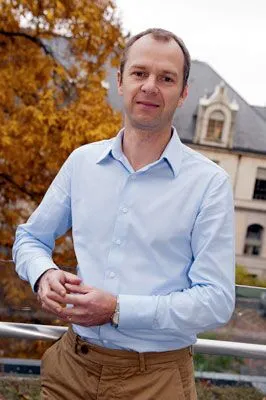Foster Economics Faculty Spotlight – Philip Bond
Get to know Foster’s Professor of Finance and Business Economics and Edward E. Carlson Distinguished Professor in Business Administration Philip Bond, who teaches the core MBA Economics course.
Please tell us a bit about your background.
I was born in London, U.K., and grew up in Aberdeen, a smallish city in the NE of Scotland. Like many people, my views about weather stem from childhood, and I’m in the small minority of people who think that December in Seattle has a good number of hours of daylight.
After studying Mathematics at Oxford I did a PhD in Economics at the University of Chicago, and have been in the US since. I met my wife at the University of Chicago—she is a humanities professor, and we’ve moved around quite a bit for a combination of our jobs. Prior to teaching at UW I taught at Kellogg, Wharton, and the University of Minnesota.
Outside of work, I have twins in high school, which keeps me on my toes. I very much enjoy outdoor activities—even by Seattle standards—and am always happy to be in the mountains.
Which factors influenced your decision to join UW Foster?
I’m in the Finance and Business Economics (FBE) department, and the quality of the department was a big factor. It might sound obvious, but on the research side, the role of an academic is to care deeply about ideas—but somehow this isn’t true of all academics. But it is true of my colleagues in FBE.
What do you find meaningful about your time thus far at Foster?
I strongly believe that universities should function as ladders of opportunity. Unfortunately, not every university really does this. But at Foster, there is a really palpable sense of the institution doing so.
How does your work align with Foster’s purpose? Purpose statement:
Together…
We Foster Leaders
We Foster Insights
We Foster Progress
…To Better Humanity
Much of my research deals with topics of broad social interest, such as “what role does the financial system play in the economy? Does it add value?” “When firms adopt ESG policies, what does this do to competition?” and “What are the likely effects of automation, including on inequality?”
How have you worked to make your classroom/course curriculum inclusive?
One significant change I’ve made in the last few years is to embrace random-calling. I know that not every student appreciates this in real-time, but I find it by far the best way to make sure that I hear from the full diversity of students who attend Foster.
In terms of content, over the last few years I’ve been progressively adding topics that address broader social concerns, to complement the course’s traditional focus on business economics. Examples are examinations of the level of corporate profits; of gender pay differences; and why more young people have been dropping out of the labor force in the recent past.
Any favorite memories from your experience with Full-Time MBAs/Evening MBAs?
Hard to pick a favorite, but International Trivia Night was a lot of fun. I learned that there are many many flags that I don’t know.
How have you supported students outside the classroom?
I have helped students with independent studies and non-profit consulting projects, which are typically done in Spring quarter.
How is your teaching influenced by instructional best practices?
The biggest thing is that I’ve been working to minimize the amount of time I spend lecturing—in particular, when a topic permits, I’ve shifted to assigning pre-class reading, with pre-class quizzes to check understanding. This frees up class time for discussions of how to apply the material, which for many topics is the main value-added of the course.
How do you maximize learning and keep students engaged?
I’m a big believer in regular “poll the class” questions. Sometimes I do these with a show of hands, sometimes through web-based services like PollEv.
Are you doing work outside of Foster that influences what happens in the classroom?
Until very recently I served as one of four editors of the Journal of Finance, which is the field’s leading academic journal. This exposed me to an unusually broad stream of cutting-edge research—at least some of which filters into what we cover in class.
How have your relationships with industry experts influenced what happens in your class?
In economics, we’re looking for a big-picture view of how industries and corporate practices work. This requires a wide-ranging knowledge of the economy—many conversations and contacts over the years have contributed to this.
Are there components of your class that can help students build their resume? E.g., Experiential learning components?
In the last couple of years I’ve added more and more data work, with the aim of introducing students to a range of data sources. “Knowing where to look” for facts about the economy isn’t quite a line on a resume, though it should be!
Please tell us about the structure of your course – what can students expect to master by the end of it?
My class is different from many other classes in that the main aim is to teach students to “think like an economist.” Economics isn’t the only way to understand the world, but it is an important way, and a handful of accessible ideas yield a lot of insight. I structure the class to facilitate this—we spend as much time as possible exploring applications of a small-ish number of core ideas.
How will students apply the knowledge and skills they gain in your classroom in their careers?
In many ways, I hope! Economics facilitates clear-eyed thinking about the drivers of prices and corporate profits. And it encourages quantitative thinking about many topics that people would otherwise be tempted to just eye-ball, or to make unfounded assertions about. All of this is valuable throughout business, and beyond.
Any tips for incoming MBAs on how they can brush up on skills/knowledge over the summer?
I always recommend a book called the “Undercover Economist,” by Tim Harford—it is very readable, mostly engaging, and covers many central topics in economics in a pretty accessible way. I usually end up assigning at least a couple of chapters as reading in my class.
What advice do you have for first year students to ace your course?
The value of economics is in giving tools to think through new situations. I set assignments, including exams, to foster this skill. Because of this, you may respond to many assignments by thinking “I’ve never seen this question before.” But you’ll always have seen the tools that you need. So step back, and consider how the tools we’ve covered in the class shed light on the problem.
A more concise way to say the same thing: Many skills are becoming commoditized. In common with many classes at Foster, I focus on hard-to-commoditize skills. Embrace this!


